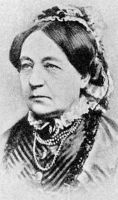Louise Otto-Peters
“Women’s participation in the interests of the government is not only their right but also their duty.” (Louise Otto in the newspaper “Sächsische Vaterlandsblätter”, Leipzig, 1843)
Why do I think the woman is important?
Her whole life was characterized by socially critical publications and claims for women’s equality and better education.
Childhood and youth
The daughter of a court director is generally regarded as the founder of the German women’s movement. As the youngest of five sisters, she grew up in a middle class liberal family in Meißen, where they used to read and to discuss a lot, also about policy and women’s rights. She lost her parents very early. So she studied in self-education and went on educational trips. At the same time, she worked as a political poet and journalist. Her first socially critical novel was called “Ludwig the waiter”.
Political writings
In the journal “Sächsische Vaterlandsblätter” a sensational letter from Louise Otto was published by the editor, in which she declared: “Women’s participation in the interests of the government is not only their right but also their duty.” Thereupon, Louise became an author in the “Sächsische Vaterlandsblätter” under the pseudonym Otto Stern.
On the occasion of a visit to her sister, who lived with her family in the Ore Mountains, Louise witnessed very closely the poverty and misery of the women working as weavers and lace makers. Under this impression she wrote in 1846 her second novel “Castle and factory”, which was confiscated in the beginning because of its rebellious content, but it could be edited after the most critical points had been deleted. Her supporters nicknamed her ”The lark of the revolutionary spring”.
Publications concerning the female workers and the women’s movement, “Lex Otto”
Louise’s publication “Speech of a German girl” in which she commented as the first German woman the problems of female workers became a political issue. In 1849 she created a women’s newspaper under the motto: “I am recruiting female citizens for the realm of freedom”, the most important journal among the publications of the early women’s movements. However, it had been edited only for four years, because it was censored on behalf of the Saxon press law, which came to action especially because of her newspaper. The law was called “Lex Otto”, which stipulated that women are excluded from the leadership of an editorial office. (Gerhard, 1990, p.37)
Marriage with August Peters and political activities
For a long time, she was engaged to the imprisoned revolutionary August Peters and they got married as soon as he was released in 1856. In Leipzig, they started together to edit the newspaper “Mitteldeutsche Volkszeitung”.
Eight years later, August died from a heart disease. Louise continued to edit the newspaper alone.
During the first German women’s conference, initiated by her, she founded, together with her friend Auguste Schmidt, the “General Union of German Women (ADF)”. From 1866, she published the Union’s paper “Neue Bahnen” and initiated the creation of female workers’ associations.
She published important writings about women’s emancipation, a large number of historical novels, short stories and poems, as well as writings about art and culture.
In the meantime, she lived in very modest conditions in Leipzig, as her father’s inheritance had been consumed by the publishing of the women’s newspapers. From 1870 she withdrew more and more from the active working in the associations, but in a pioneering way remained connected with the women’s movement until her death, alone by her editorial work for the “Neue Bahnen”.
Honors
Several streets, lanes and places in Leipzig and in some other German cities as well as some schools were named after her.
Bibliography
-
Kolhagen, Norgard, Louise Otto-Peters, in: Hans Jürgen Schultz (Hrsg.) Frauen. Porträts aus zwei Jahrhunderten. Krenz-Verlag, Stuttgart 1981, S. 102 – 113.
Links
-
https://www.dhm.de/lemo/html/biografien/OttoPetersLouise/index.html (19.2.14)
-
http://www.frauenmediaturm.de/themen-portraets/feministische-pionierinnen/louise-otto-peters/ (19.2.14)
-
http://www.louiseottopeters-gesellschaft.de/index.php?id=verein (19.2.14)
-
http://www.bpb.de/gesellschaft/gender/frauenbewegung/35309/louise-otto-peters?p=all (19.2.14)
Photo
-
Image of German women's rights activist Louise Otto-Peters, Date: uploaded January 2008. Image c1860 to 1870, Author: NN, License: PD, Source: German Parliament (Bundestag) website http://www.bundestag.de/blickpunkt/bilderInhalte/0402/500px/0402030a1.jpg, http://commons.wikimedia.org/wiki/File:Louise_Otto-Peters.jpg




